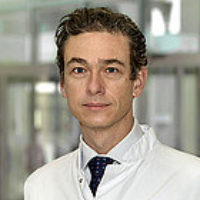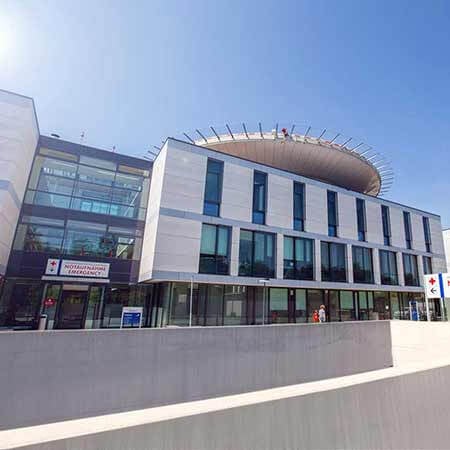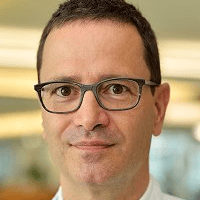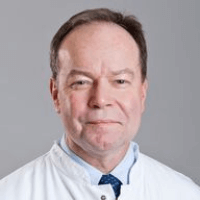Surgical treatment of Brain Astrocytoma in the Best Hospitals in the World
Treatment prices are regulated by national law of the corresponding countries, but can also include additional hospital coefficients. In order to receive the individual cost calculation, please send us the request and medical records.

Department of Adult and Pediatric Neurosurgery, Spinal Surgery
The Department of Adult and Pediatric Neurosurgery, Spinal Surgery offers all the possibilities of modern surgical treatment for diseases of the central and peripheral nervous system in patients of all ages. More than 6,000 surgical procedures are performed annually in the department's high-tech operating rooms. Both planned and emergency neurosurgical procedures are performed here. The department's surgical team focuses on patients with cerebrovascular diseases, brain and skull base tumors, spine and spinal cord diseases, cerebrospinal fluid circulation disorders, and pathologies of the peripheral nervous system. The department's team of physicians also has extensive experience in functional neurosurgery: specialists perform deep brain stimulation for movement disorders, spinal cord stimulation for back pain, and vagus nerve stimulation for epilepsy. The department works closely with neurologists, radiologists, and nuclear medicine specialists to provide patients with the highest level of comprehensive medical care. The department is recognized as one of the top neurosurgical centers in Germany and beyond, as evidenced by consistently high treatment success rates and numerous quality certifications, including the German Cancer Society (DKG) Certificate, the German Spine Society (DWG) Certificate, and the Leading Medicine Guide Certificate.







Department of Adult and Pediatric Neurosurgery
The Department of Adult and Pediatric Neurosurgery offers the full range of surgical treatment of diseases of the brain, spine, spinal cord and nerves in adults and children. The department keeps pace with new trends in medicine, as well as contributes significantly to their development. Therefore, the most modern diagnostic and therapeutic methods are available here. An individual approach to each clinical case is crucial to ensure optimal treatment results with the preservation of all neurological functions.


Department of Adult and Pediatric Neurosurgery
According to the Focus magazine, the Department of Adult and Pediatric Neurosurgery ranks among the top German medical facilities specializing in the surgical treatment of brain tumors! The department offers the full range of diagnostics and surgical treatment of diseases of the central and peripheral nervous system. A specially trained team of pediatric neurosurgeons provides treatment for various neurosurgical pathologies in children. During the treatment, the doctors use state-of-the-art equipment, in particular, imaging-guided neuronavigation, functional imaging (fMRI), intraoperative mapping, intraoperative videoangiography, etc.






Astrocytoma is a brain tumor that develops from astroglia cells. It can be benign (grades 1 and 2) or malignant (grades 3 and 4). Different approaches are used to treat different types of brain tumors. In any clinical situation, surgery is the first-line treatment option. Administration of additional methods, such as radiation therapy and chemotherapy, depends not only on the degree of malignancy of the astrocytoma, but also on the radicality of the previous surgery.
Indications for surgical treatment
In most cases, any brain tumor, including astrocytoma, is a direct indication for surgery. Surgery remains the main method of astrocytoma treatment, since it gives the highest chance for curing the disease.
There are only a few clinical situations in which the operation is not considered:
- The brain tumor has a small size (under 3 cm). In this case, the patient may choose between the surgery and radiation therapy. Many people prefer radiation therapy, as this method is bloodless, safer, painless and does not require long-term recovery.
- The brain tumor is inoperable. For example, the neoplasm may be located in the hard-to-reach region or near the vital brain regions. Before each intervention a team of surgeons consider all the risks and possible benefits of the surgery. If risks are more significant, the surgery is not performed.
- The patient refuses to undergo the surgery. Patients with any size of brain tumor may not agree to have surgery. Therefore, the main methods of treating astrocytoma are radiation therapy and chemotherapy.
- Contraindications for surgery. Some patients are too weakened by concomitant diseases, so they cannot tolerate surgery. For them, more sparing radiation therapy is the better option.
Principles of surgical treatment of astrocytoma
To cure cancer, the brain tumor must be removed completely. In this case, the risk of recurrence is reduced significantly. For some types of astrocytomas, complete removal excludes need for the subsequent radiation therapy. This leads to lower risk of complications development, shorter hospital stay, and lower expenditures on treating astrocytoma.
Aims of surgical treatment:
- The most possible radical removal of the brain tumor (preferably complete)
- Avoiding damage to functionally important areas of the brain
- Removing the tumor through the tiniest possible surgical access in order to reduce blood loss and the risk of postoperative bleeding
It is important for a doctor not only to cure the patient, but also to ensure good quality of life after the operation and avoid aggravating the neurological deficit. Therefore, if complete removal of the neoplasm without the risk of damage to functionally important areas of the brain is impossible, the astrocytoma is excised partially, and the residual tumor is destroyed with the help of radiation therapy.
Preoperative examination
In the foreign hospitals, a thorough examination of patients is carried out before the operation. It is necessary to:
- Evaluate the size of the tumor and its precise location
- Determine the type of astrocytoma, the degree of its malignancy
- Identify functionally important areas of the brain in order to avoid their damage
The best hospitals in the world use high-precision equipment that allows determining not only configuration of the tumor, but also, with a high probability, its histological type. Doctors use MRI, magnetic resonance spectrography, and positron emission tomography. The functional MRI allows assessing functionally important areas of the brain.
The general preoperative examination is also performed. It includes complete blood count, general urine analysis, blood sugar test, assessment of liver and kidneys function, EGG, etc.
How is the operation performed?
Neurosurgical intervention is performed under the general anesthesia. The doctor cuts the skin, performs craniotomy, dissects and coagulates the dura mater. The astrocytoma is removed with the help of a surgical instrument or by coagulation. Low-density brain tumors can be destroyed by ultrasound and aspirated through a thin tube.
Abroad, neurosurgical interventions are carried out under the control of neuronavigation. They do not require fixing a rigid frame to the patient's skull with screws. Neuronavigation systems allow better control and precision during the operation. They visualize the whole volume of a patient's brain directly during surgery.
For the high grade astrocytomas, intraoperative fluorescence diagnostics is often used in the foreign hospitals. The method makes it possible to distinguish astrocytoma from healthy brain tissue better. For this, a special dye is used, which accumulates in cancer cells. Its use allows:
- Removing the tumor more radically
- Avoiding damage to a healthy brain tissue
Conducted in Germany clinical trials have demonstrated that in malignant tumors fluorescence diagnostics doubles the chance of complete astrocytoma removal and increases survival rates.
If necessary, functional mapping and electrophysiological examinations are used during surgery in the leading foreign hospitals. They allow identifying functionally important areas of the brain in order to avoid their damage.
Additional treatment after the surgery
There are several factors that determine whether a patient needs additional treatment for astrocytoma. These are the degree of tumor malignancy, the radicality of tumor removal, the state of the patient's health (whether he can tolerate the additional treatment).
Depending on the level of malignancy, the choice of therapeutic tactics includes:
- 1 or 2 grade astrocytomas do not require postoperative radiation therapy if they are removed completely
- 2 grade astrocytomas are treated with radiation therapy only if they are removed partially
- 3 or 4 grade astrocytomas always require additional treatment after surgery
For malignant astrocytomas, combined treatment is always used. The therapeutic scheme includes surgery, radiation therapy and chemotherapy. Radiotherapy is carried out when the surgical wound is healed completely. This usually takes at least 2 weeks, and more often – 4-6 weeks. In the exceptional cases, if the brain tumor is very aggressive and growing rapidly, chemotherapy with radiation therapy may be started earlier.
Why is it better to receive treatment abroad?
Patients choose where to receive treatment based on the following factors:
- The level of medicine in a particular country
- The cost of treatment
- The waiting period for receiving innovative or high-tech medical care
Abroad, it is possible to remove a brain tumor more effectively, safely, as well as to receive high-quality additional treatment for astrocytoma. In many countries, prices for medical services are low, and the operation can be performed much faster. The timing of treatment start is especially important for patients with rapidly growing and aggressive tumors.
As a rule, medical tourists contact large, well-equipped hospitals with reputable doctors and other medical staff. There are several reasons why it is better to be treated in such hospitals.
- High precision of diagnosis making. The effectiveness and safety of treatment largely depends on the correctness of the diagnosis. Even before the operation, the doctor determines the type of tumor, its shape and location, peculiarities of the blood supply and proximity to anatomically important structures.
- Low risk of complications development. Reliable methods of determining functionally important areas of the brain are used abroad. The examination is carried out both before the surgery and during the intervention. By knowing where exactly these areas are located, the doctor can avoid damaging them. As a result, the risk of neurological complications of surgery is reduced significantly.
- Complete removal of the tumor. Maximal possible removal is important for astrocytomas of any degree of malignancy. It allows curing the disease completely with a high probability, and in some cases it allows avoiding the need for radiation therapy. It is especially difficult to remove malignant astrocytomas completely, since they have no clear boundaries and grow into healthy brain tissue. Fluorescent intraoperative diagnostics is used abroad. Doctors apply it to distinguish pathological tissue from the healthy one and remove altered loci completely.
- Complementary treatment of high quality. After surgery, patients often receive radiation therapy. Abroad, it is carried out on the latest equipment. Linear accelerators and radiosurgical equipment of the latest generations direct the beams at the tumor from different sides precisely, considering its configuration. New modes of radiation therapy can destroy remnants of astrocytoma with minimal risk of complications development.
- Affordable cost of treatment. Some patients travel to Turkey or India to undergo astrocytoma treatment at a low cost. Others go to developed countries. The services of doctors in Germany and Israel are in great demand among medical tourists. With a high level of development of the healthcare system, these countries have one of the best ratios of price and quality of medical services.
Treatment abroad with Booking Health
To undergo an operation for astrocytoma abroad, in one of the best clinics in the world, you may use the Booking Health service. On the Booking Health portal you can find information about hospitals, doctors and prices. You may compare the cost of treatment in different clinics and book a medical program at the best price.
Booking Health will arrange a trip abroad for you. The services and benefits of Booking Health include:
- Сhoosing a clinic with the specialization in the astrocytoma surgery and the high rate of performing operations efficiently and safely
- Direct communication with the treating physician
- Reducing the waiting time for astrocytoma treatment start and making an appointment at a convenient date
- Reduced cost of treatment; prices are reduced due to avoiding coefficients for foreign patients
- Control of the cost of medical procedures and return of unspent funds after the completion of treatment of a brain tumor
- Preparation of a medical program without the need to repeat previously performed diagnostic procedures
- Communication with the clinic after astrocytoma treatment completion
- Purchase and sending of medical products
- Arranging additional diagnostics or treatment abroad
Booking Health specialists provide high-quality service. We will book a hotel and air tickets for you, organize a transfer from the airport to the hospital and back.

